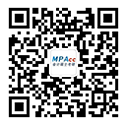您好!欢迎来到中国会计硕士网!
2011年全国管理类联考英语二真题及答案
发布时间:2015-03-27 15:30:59 浏览量:
Section I Use of English
Directions: Read the following text. Choose the best word(s) for each numbered black and mark A, B, C or D on ANSWER SHEET 1. (10 points)
The Internet affords anonymity to its users, a blessing to privacy and freedom of speech. But that very anonymity is also behind the explosion of cyber-crime that has 1 across the Web.
Can privacy be preserved 2 bringing safety and security to a world that seems increasingly 3 ?
Last month, Howard Schmidt, the nation‘s cyber-czar, offered the federal government a 4 to make the Web a safer place-a “voluntary trusted identity” system that would be the high-tech 5 of a physical key, a fingerprint and a photo ID card, all rolled 6 one. The system might use a smart identity card, or a digital credential 7 to a specific computer .and would authenticate users at a range of online services.
The idea is to 8 a federation of private online identity systems. User could 9 which system to join, and only registered users whose identities have been authenticated could navigate those systems. The approach contrasts with one that would require an Internet driver‘s license 10 by the government.
Google and Microsoft are among companies that already have these“single sign-on” systems that make it possible for users to 11 just once but use many different services.
12 .the approach would create a “walled garden” n cyberspace, with safe “neighborhoods” and bright “streetlights” to establish a sense of a 13 community.
Mr. Schmidt described it as a “voluntary ecosystem” in which “individuals and organizations can complete online transactions with 14 ,trusting the identities of each other and the identities of the infrastructure 15 which the transaction runs”。
Still, the administration‘s plan has 16 privacy rights activists. Some applaud the approach; others are concerned. It seems clear that such a scheme is an initiative push toward what would 17 be a compulsory Internet “drive’s license” mentality.
The plan has also been greeted with 18 by some computer security experts, who worry that the “voluntary ecosystem” envisioned by Mr. Schmidt would still leave much of the Internet 19 .They argue that all Internet users should be 20 to register and identify themselves, in the same way that drivers must be licensed to drive on public roads.
1. A.swept B.skipped C.walked D.ridden
2. A.for B.within C.while D.though
3. A.careless B.lawless C.pointless D.helpless
4. A.reason B.reminder C.compromise D.proposal
5. A.information B.interference C.entertainment D.equivalent
6. A.by B.into C.from D.over
7. A.linked B.directed C.chained D.compared
8. A.dismiss B.discover C.create D.improve
9. A.recall B.suggest C.select D.realize
10. A.relcased B.issued C.distributed D.delivered
11. A.carry on B.linger on C.set in D.log in
12. A.In vain B.In effect C.In return D.In contrast
13. A.trusted B.modernized c.thriving D.competing
14. A.caution B.delight C.confidence D.patience
15. A.on B.after C.beyond D.across
16. A.divided B.disappointed C.protected D.united
17. A.frequestly B.incidentally C.occasionally D.eventually
18. A.skepticism B.relerance C.indifference D.enthusiasm
19. A.manageable B.defendable C.vulnerable D.invisible
20. A.invited B.appointed C.allowed D.forced
Section II Reading Comprehension
Part A Directions:
Read the following four texts. Answer the questions after each text by choosing A, B, C or D. Mark your answers on ANSWER SHEET 1. (40points)
Text 1
Ruth Simmons joined Goldman Sachs‘s board as an outside director in January 2000: a year later she became president of Brown University. For the rest of the decade she apparently managed both roles without attracting much eroticism. But by the end of 2009 Ms. Simmons was under fire for having sat on Goldman’s compensation committee; how could she have let those enormous bonus payouts pass unremarked? By February the next year Ms. Simmons had left the board. The position was just taking up too much time, she said.
Outside directors are supposed to serve as helpful, yet less biased, advisers on a firm‘s board. Having made their wealth and their reputations elsewhere, they presumably have enough independence to disagree with the chief executive’s proposals. If the sky, and the share price is falling, outside directors should be able to give advice based on having weathered their own crises.
The researchers from Ohio University used a database hat covered more than 10,000 firms and more than 64,000 different directors between 1989 and 2004. Then they simply checked which directors stayed from one proxy statement to the next. The most likely reason for departing a board was age, so the researchers concentrated on those “surprise” disappearances by directors under the age of 70. They fount that after a surprise departure, the probability that the company will subsequently have to restate earnings increased by nearly 20%. The likelihood of being named in a federal class-action lawsuit also increases, and the stock is likely to perform worse. The effect tended to be larger for larger firms. Although a correlation between them leaving and subsequent bad performance at the firm is suggestive, it does not mean that such directors are always jumping off a sinking ship. Often they “trade up.” Leaving riskier, smaller firms for larger and more stable firms.
But the researchers believe that outside directors have an easier time of avoiding a blow to their reputations if they leave a firm before bad news breaks, even if a review of history shows they were on the board at the time any wrongdoing occurred. Firms who want to keep their outside directors through tough times may have to create incentives. Otherwise outside directors will follow the example of Ms. Simmons, once again very popular on campus.
21. According to Paragraph 1, Ms. Simmons was criticized for .
[A]gaining excessive profits
[B]failing to fulfill her duty
[C]refusing to make compromises
[D]leaving the board in tough times
22. We learn from Paragraph 2 that outside directors are supposed to be .
[A]generous investors
[B]unbiased executives
[C]share price forecasters
[D]independent advisers
23. According to the researchers from Ohio University after an outside director‘s surprise departure, the firm is likely to .
[A]become more stable
[B]report increased earnings
[C]do less well in the stock market
[D]perform worse in lawsuits
24. It can be inferred from the last paragraph that outside directors .
[A]may stay for the attractive offers from the firm
[B]have often had records of wrongdoings in the firm
[C]are accustomed to stress-free work in the firm
[D]will decline incentives from the firm
25. The author‘s attitude toward the role of outside directors is .
[A]permissive
[B]positive
[C]scornful
[D]critical
Text 2
Whatever happened to the death of newspaper? A year ago the end seemed near. The recession threatened to remove the advertising and readers that had not already fled to the internet. Newspapers like the San Francisco Chronicle were chronicling their own doom. America‘s Federal Trade commission launched a round of talks about how to save newspapers. Should they become charitable corporations? Should the state subsidize them ? It will hold another meeting soon. But the discussions now seem out of date.
In much of the world there is the sign of crisis. German and Brazilian papers have shrugged off the recession. Even American newspapers, which inhabit the most troubled come of the global industry, have not only survived but often returned to profit. Not the 20% profit margins that were routine a few years ago, but profit all the same.
It has not been much fun. Many papers stayed afloat by pushing journalists overboard. The American Society of News Editors reckons that 13,500 newsroom jobs have gone since 2007. Readers are paying more for slimmer products. Some papers even had the nerve to refuse delivery to distant suburbs. Yet these desperate measures have proved the right ones and, sadly for many journalists, they can be pushed further.
Newspapers are becoming more balanced businesses, with a healthier mix of revenues from readers and advertisers. American papers have long been highly unusual in their reliance on ads. Fully 87% of their revenues came from advertising in 2008, according to the Organization for Economic Cooperation Development (OECD)。 In Japan the proportion is 35%. Not surprisingly, Japanese newspapers are much more stable.
The whirlwind that swept through newsrooms harmed everybody, but much of the damage has been concentrated in areas where newspaper are least distinctive. Car and film reviewers have gone. So have science and general business reporters. Foreign bureaus have been savagely cut off. Newspapers are less complete as a result. But completeness is no longer a virtue in the newspaper business.
26. By saying “Newspapers like … their own doom” (Lines 3-4, Para. 1), the author indicates that newspaper .
[A]neglected the sign of crisis
[B]failed to get state subsidies
[C]were not charitable corporations
[D]were in a desperate situation
MPAcc工具箱

立即申请会计硕士(MPAcc)
管理类联考历年真题

全国MPAcc报名服务中心

第一时间获得意向MPAcc院校的招生政策

直接对话MPAcc招生办公室邀请您拜访学校、参加公开课

独家奖学金申请指导
热门院校排行榜






